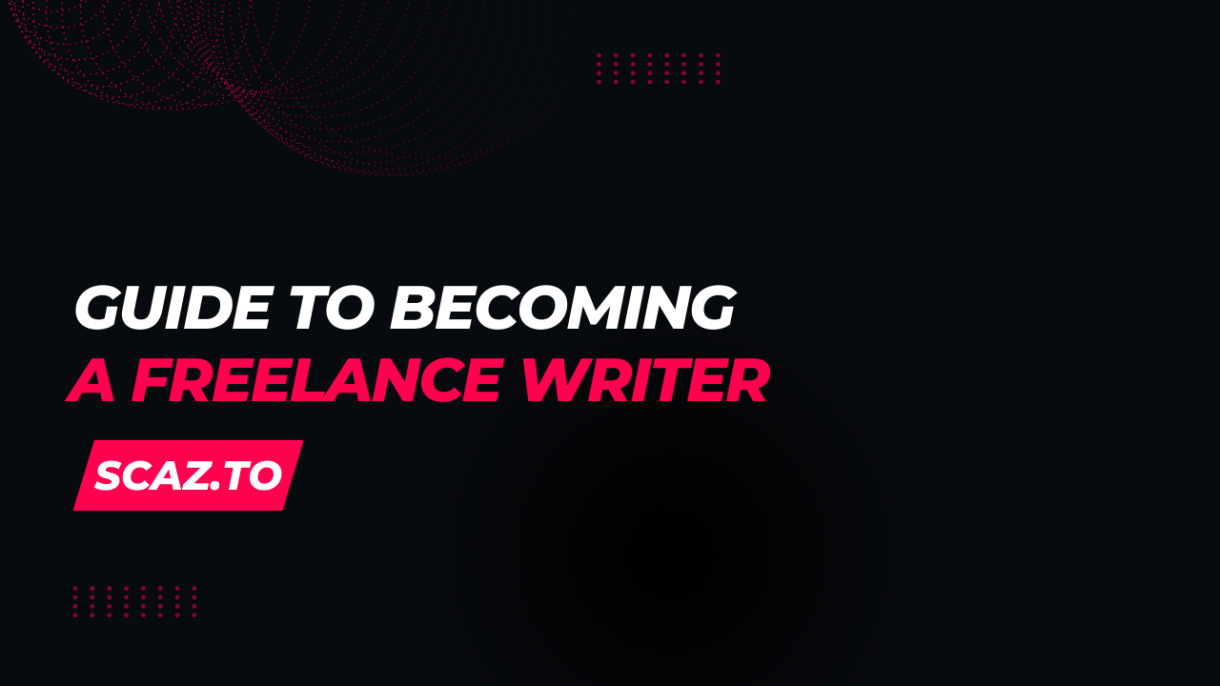If you’re new to freelance writing or planning to get started as a freelance writer, follow this guide, and you’ll be able to avoid many of the mistakes I’ve made over the years.
As a freelance writer, I took seven years of mistakes, failures, and many depressing moments to go from $0 to $5,000 a month. And I know many writers still need help making a few bucks online.
This article is for you. My NO BS guide to the best approach to getting started as a freelance writer, the right way.
Do You Have What it Takes to be a Freelance Writer?

Most so-called “experts” and “gurus” make freelancing sound like a walk in the park and mislead people into believing freelancing is a quick fix for your financial problems, a way for you to make some fast cash to pay off your bills or earn some extra money during your vacations.
Well, I hate to tell you that you will not make it as a freelance writer if you’re only looking for a quick fix. Don’t start freelancing for the wrong reasons because you will have to work hard to start making money as a freelancer.
And be prepared to do a few weeks of hard work without making an income because it won’t come easy.
You’ll also need to be passionate about writing to be a successful freelance writer. It’s not something you’re born with it but something you develop over time.
For example, if you quickly get bored reading books and long articles, there may be better paths than writing for you.
So, take a moment to think things through before getting started and ask yourself: Do I want to be a freelance writer, or am I just looking for a quick fix for my financial problems?
Different Types Of Writing Gigs You Should Know About

Freelance writing is a broad field with many categories. Before you start, you should learn about the different types of freelance writing and choose the one you are most comfortable with.
Here are just a few of the types of freelance writing:
- Copywriting: Copywriting work usually involves everything from writing promotional content for brands, writing product descriptions, writing articles for blogs and magazines, and everything in between.
- Article Writing: Writing articles for online publications and blogs differs from writing essays for college.
- Blog Writing: Writing for blogs means you will also have to learn a little about blogging. This includes learning to work with WordPress, SEO, and more.
- eBook Writing: Writing eBooks differs from one industry to another. You’ll need to study different types of eBooks to be a successful writer.
- Website Content Writing: This mainly involves writing content for website pages, such as home pages, product pages, about pages, etc.
- Ghostwriting: Writing content for people to publish under their names. You won’t get credit for this type of work. But you can increase your price for this type of job.
- Fiction Writing: This could be the right path for you if you have an imaginative mind. But, it’s not easy to find fiction writing freelance jobs.
- Resume and Cover Letter Writing: Another type of writing with low demand.
- Technical Writing: This is the writing you see on product manuals and terms of an agreement and privacy policy pages.
Find Your Niche, But Keep Your Options Open
You can only call yourself a freelance writer if you can work with all (or at least most) of the above categories. So don’t try to be a jack of all trades. Instead, be specific about your skills. Limit yourself to one niche.
For example, if you’re good at writing eBooks, call yourself a freelance eBook writer. If you’re good at writing essays, call yourself a freelance essay writer.
Limiting your skills to a niche can help you gain experience in a specific area and get work more easily. But don’t limit yourself to one niche. Keep your options open.
For example, I mostly work with corporate blogs and write blog articles to help develop different types of blogs. But I also write ebooks, newsletters, and do copywriting when I can or when I feel like I need a change of pace.
Because there will be times when you desperately need the money. At those times, you should be ready to take on any kind of writing work.
Learn to write like a pro. (Even if you don’t feel like one)
When I developed my first blog, freshinfos.com (no longer active), I wrote 15 to 20 articles a day for the first 3 months, working almost 20 hours a day. I was really pushing myself to the limit. Then I slowed down to writing about 6 to 10 articles a day. This went on for over 4 years.
Most of the time they were small articles of about 300 to 500 words. But it was hard for me at first. English is my second language. I wasn’t very good at it. And I had to learn from scratch to write for an online audience.
My writing was terrible for the first few months. I received a lot of harsh comments and bullying from readers. They pointed out my grammatical mistakes and made jokes.
But I kept going and writing more and more articles. And that’s the main reason I got to where I am today.
My blog helped me practice the art of writing for an online audience, even without realizing it. While I still have a lot to learn about writing, my skills have improved drastically to the point where I can write as well as native English speakers.
What I’m trying to say is that you have to practice. No matter what you think about your abilities or what others say about your work, keep practicing. You may make mistakes, but keep writing. You’ll learn along the way.
In the book Outliers, Malcolm Gladwell says that it takes 10,000 hours of practice to master a skill. He points out that some of the most iconic artists and inventors, like Bill Gates and Mozart, put in the same amount of practice to master their skills.
It’s not too late for you to start practicing.
Start Building Your Reputation And Experience
Another benefit of developing my blog was that it doubled as my portfolio. Whenever a client asked me to show them examples of my work, I simply sent them a link to my blog. It really helps increase my success rate.
Now, you don’t have to have your own self-hosted blog to get started as a freelance writer. There are other ways to build your reputation.
If you want to be a writer, you must do two things above all others: read a lot and write a lot.” – Stephen King
The first and most effective method is to get published on other established blogs. There are hundreds of great blogs out there that accept guest posts from people outside their writing staff, such as LifeHack, ProBlogger, and Mashable.
Getting a few of your articles published on these blogs will help you convince your clients that you’re a skilled writer, not just someone who claims to be.
However, you have to be really good at writing to get an article published on another blog. They only accept the best.
So if you’re brand new, start by starting a personal blog on a free platform. Medium is my favorite place to write. It’s free and gives you more exposure for your posts.
Start a personal blog on Medium and write about topics related to your niche industry. As long as your writing is good, you can even use your Medium blog as your portfolio.
Also, familiarize yourself with the WordPress platform and learn how to use it. Learn about search engine optimization. Learn how to format eBooks.
These skills will give you bonus points when sending proposals to new clients.
Hourly Or Fixed Pricing?
Whether you should charge by the hour or by the project is a question that freelancers have been debating for a long time.
It really depends on the type of work you do. For example, an hourly rate is more appropriate for a copywriter who works mostly on website copy. And a fixed rate is appropriate for a blogger who writes articles based on word count.
On the other hand, pricing also depends on how fast and skilled you are. For example, I can write a 1,000 word article on certain topics in about 30 minutes. If I were to charge an hourly rate, I would be undervaluing my work.
So I always stick to fixed prices. It’s fair to both the freelancer and the client, and I don’t have to worry about tracking my hours. One less thing for me to worry about.
Choose A Platform To Offer Your Services
I know there are experts who will tell you not to use freelance platforms to offer your services. But I encourage you to use a platform or job board to find work, at least for the first few months.
We all have to start somewhere, right? And what better way to learn about different types of freelance work and find out what other freelancers are doing than on a freelance platform.
However, you also need to be careful when choosing a platform to offer your services. Most beginners make the most obvious choice and sign up with the most popular freelance sites, such as UpWork or Freelancer.com.
You need to avoid these platforms. There is too much competition on these sites and it will demean your skills and force you to sink to the level of cheap freelancers who engage in bidding wars to win work.
Instead, focus on new and smaller freelance sites and job boards. I know what you’re thinking: New and smaller sites don’t get as many clients as the big sites, so how is that going to help me get more work, right?
Well, it’s a lot like finding your niche. Smaller sites have fewer freelancers competing for work. And if you know how to write killer proposals and already have a great reputation, you can get more work even if there are only a few jobs available on that platform.
Best Places To Find Freelance Writing Jobs
So I advised you to avoid popular freelance platforms like UpWork and Freelancer.com. And especially stay away from Fiverr.
But what other places are there to find work?
Actually, there are a lot of great websites, platforms, and job boards where you can offer your services and find freelance writing gigs. These are my top picks.
- ProBlogger Job Board: A regularly updated job board with high-paying freelance writing gigs. Best for professional writers.
- AngelList: Remote job vacancies posted by startups. High paying but more complex work.
- goLance: A fairly new freelancing site with low platform fees.
- RemoteOK: A mix of content and digital marketing jobs. Best for content marketers.
- Inbound Jobs: Complex marketing and content writing jobs. Best for advanced writers and content marketers.
Stick to one job board or a platform. Try not to copy-paste your proposals and apply to jobs in bulk. It’ll be just a waste of time.
Futher Reading: 24 New Freelancing Websites with Low Competition
How To Write A Killer Proposal To Clients
A few months ago, I did a small case study by posting a fake job on UpWork and Freelancer (link to full case study below). A lot of freelancers applied for the job, and I was able to learn a lot from their mistakes.
One of the most common mistakes they make is to come on strong early in their proposals. It makes them sound desperate. Most of the time, they were offering really low prices to get the job done.
Professional freelancers never write proposals like this. Here’s a sample email template to give you an idea of how it’s done:
Hi [Client Name],
My name is [your name] and I’m a freelance copywriter.
I just saw your job posting on [website name] and noticed that there’s an opening for a blog article writer on your business blog.
I’ve been working online as a freelance writer for [number of years] and have been able to help develop several great and successful blogs for my clients. Including [name some of the clients you’ve worked with].
I have also published several articles on popular, authoritative websites such as [name and link to websites]. Take a look and see if my writing style fits your blog strategy.
I understand that getting lots of social media shares is just as important as optimizing articles for search engines. And I use a handful of tools to make sure I target both.
If you like, I can come up with some topics and ideas for great articles for your blog.
Let me know if you’re interested.
Regards,
[Your email signature]
Advice From One Freelance Writer To Another
Even though this strategy worked for me, I can’t guarantee that it will work for you. But if it worked for me, it can work for you!
Going forward, keep a few things in mind. If you really want to succeed and be an exceptional writer, don’t be too greedy. Don’t charge extra for every little bit of extra work you do for your clients.
Be willing to go the extra mile. Whether it’s writing an extra 100 words or preparing the images for the articles, it will help you stand out in a crowd of freelance writers.
Focus on delivering the highest quality work every time. Treat every assignment you receive as your first. Look for ways to make your clients happy.
Finally, don’t be a jerk. Always be nice to your clients and watch your temper. Whether they criticize your work or ask for more revisions, learn to keep your cool.
Further Reading: 5 Powerful Psychological Tricks for Getting More Freelance Clients
Conclusion
As you can see, it will take a while before you can complete all of these steps and start making some real money. But it will definitely be worth the effort.
One more thing, while you are working from freelance websites and job boards, create a personal portfolio website for yourself. This website will help you slowly move away from relying on job boards and start getting offers from clients directly via email.
I send a link to my personal website whenever a client asks what kind of work I do and when they want to see examples of my work.
Keep improving and don’t stop learning. Your success will depend on it!


